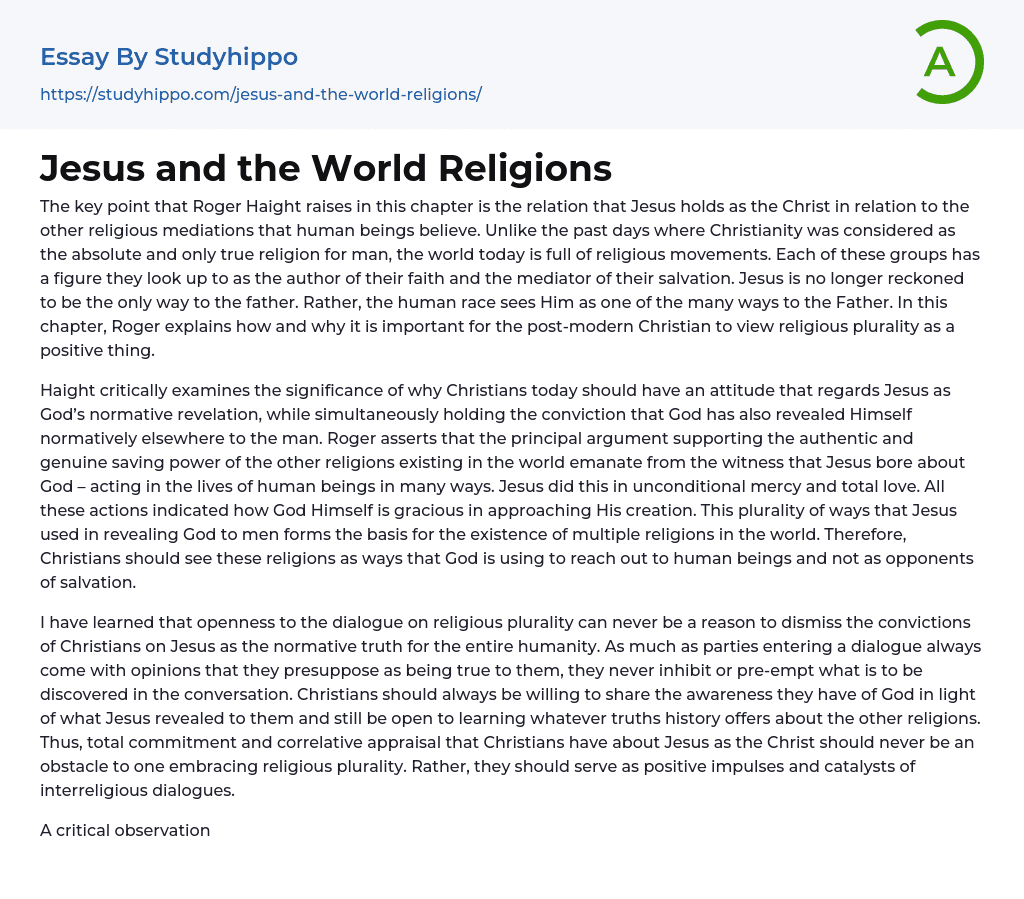In this chapter, Roger Haight examines the comparison of Jesus as the Christ to other religious intermediaries. Previously, Christianity was seen as the only and ultimate religion. However, in today's society, there are diverse religious movements with their own leaders regarded as sources of faith and saviors. Consequently, Jesus is no longer perceived as the exclusive route to God.
In this chapter, Roger explains the importance of post-modern Christians viewing religious plurality as positive. He argues that while Christians should regard Jesus as God's normative revelation, they should also recognize that God has revealed Himself elsewhere. Roger asserts that the authentic saving power of other religions comes from the witness of Jesus, who acted with unconditional mercy and total love to show how God approaches His creation.
The existence of multiple religions in the world is due to Jesus revea
...ling God to humanity in various ways. Consequently, Christians should perceive these religions as channels through which God reaches out to humans, rather than perceiving them as hindrances to salvation. I have come to comprehend that being open to discussions about religious diversity should not result in disregarding the beliefs held by Christians regarding Jesus as the ultimate truth for all of humanity. Just like individuals entering a conversation hold their own opinions as valid, they should not impede or preempt what can be learned through dialogue. Christians should always be ready to share their knowledge about God based on Jesus' teachings while also remaining receptive to the truths that history offers about other religions.
Thus, Christians' complete dedication and corresponding evaluation of Jesus as the Christ should not hinder their acceptance of religious diversity. Instead, these beliefs should
encourage and stimulate interreligious discussions. One important point from this chapter is that religious diversity has deep historical origins and will continue in the future. Therefore, Christians should welcome and approach this diversity with a positive attitude based on theological perspectives.
It is true to a certain degree that these faiths have a role in God's saving grace. It would be theologically incorrect to label them as false since they have a rich history of beliefs. Post-modern Christians should not view these religions as competitors to God's saving work through Jesus Christ. Instead, they should be open to understanding the core teachings of these belief systems. There should be an eagerness to learn about God's ways through dialogues with these religions if one wishes to gain from the discussions. The ultimate goal of these conversations should not be to convert or create a universal religion.
Instead, it should be a system that aims to reveal the truth of God that these religious systems carry.
Work Cited
- Haight, Roger. Jesus, Symbol of God. Maryknoll, N.Y: Orbis Books, 1999. Print.
- Adam And Eve essays
- Baptism essays
- Catholic Church essays
- Christian essays
- Church essays
- Crucifixion Of Jesus essays
- Crusades essays
- Elizabeth essays
- Eucharist essays
- God The Father essays
- Holy Spirit essays
- Jesus Christ essays
- Lord essays
- Pope essays
- Priest essays
- Protestant Reformation essays
- Protestantism essays
- Sacrament essays
- Afterlife essays
- Atheism essays
- Bible essays
- Buddhism essays
- Christian Worldview essays
- Christianity essays
- Confession essays
- Cosmological Argument essays
- Deism essays
- Devil essays
- Existence of God essays
- Faith essays
- Freedom Of Religion essays
- God essays
- Hinduism essays
- Immortality essays
- Islam essays
- Jainism essays
- Jews essays
- Judaism essays
- Miracle essays
- Monk essays
- Monotheism essays
- New Testament essays
- Old Testament essays
- Pilgrimage essays
- Puritans essays
- Revelation essays
- Ritual essays
- Salvation essays
- Sin essays
- Sinners essays




